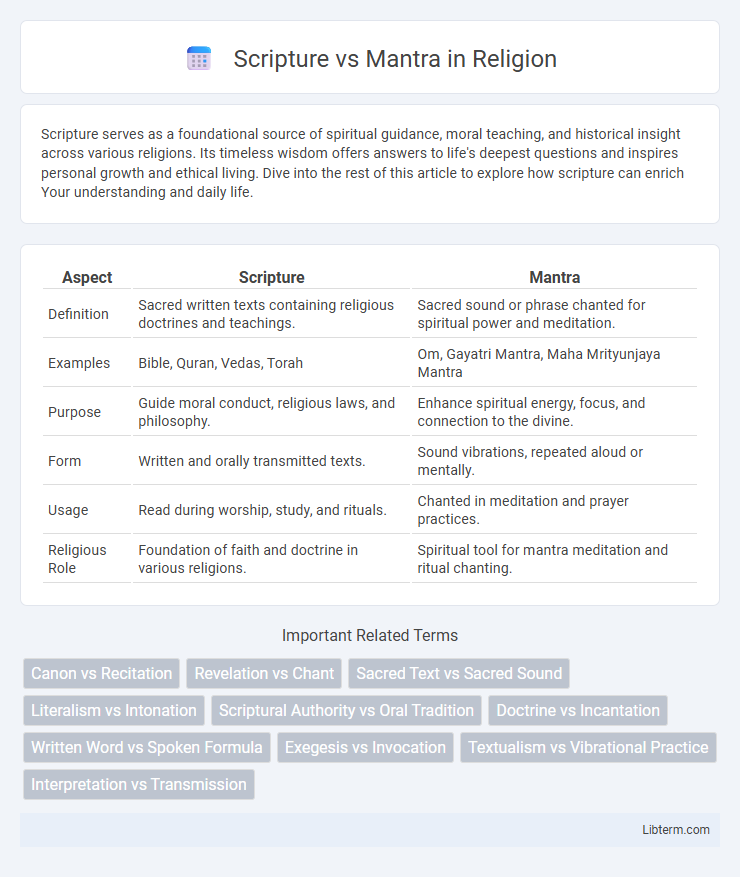Scripture serves as a foundational source of spiritual guidance, moral teaching, and historical insight across various religions. Its timeless wisdom offers answers to life's deepest questions and inspires personal growth and ethical living. Dive into the rest of this article to explore how scripture can enrich Your understanding and daily life.
Table of Comparison
| Aspect | Scripture | Mantra |
|---|---|---|
| Definition | Sacred written texts containing religious doctrines and teachings. | Sacred sound or phrase chanted for spiritual power and meditation. |
| Examples | Bible, Quran, Vedas, Torah | Om, Gayatri Mantra, Maha Mrityunjaya Mantra |
| Purpose | Guide moral conduct, religious laws, and philosophy. | Enhance spiritual energy, focus, and connection to the divine. |
| Form | Written and orally transmitted texts. | Sound vibrations, repeated aloud or mentally. |
| Usage | Read during worship, study, and rituals. | Chanted in meditation and prayer practices. |
| Religious Role | Foundation of faith and doctrine in various religions. | Spiritual tool for mantra meditation and ritual chanting. |
Understanding Scripture: Definition and Origins
Scripture refers to sacred writings that form the foundation of religious beliefs, often regarded as divinely inspired or revealed. These texts, such as the Bible, Quran, and Vedas, originate from specific historical and cultural contexts, reflecting the doctrines and traditions of their respective faiths. Understanding scripture requires interpreting its language, symbolism, and teachings within the framework of theological scholarship and religious practice.
Defining Mantra: History and Purpose
Mantras are sacred sounds or phrases originating from ancient Hindu and Buddhist traditions, used as tools for meditation, spiritual focus, and vibration alignment. Historically, mantras were orally transmitted and believed to carry spiritual power capable of altering consciousness and connecting practitioners to divine forces. Unlike scriptures, which are written texts containing religious doctrines and narratives, mantras function primarily as repetitive chants aimed at invoking protection, healing, and inner transformation.
Key Differences Between Scriptures and Mantras
Scriptures are extensive sacred texts that contain doctrinal teachings, stories, and philosophical concepts forming the foundation of religious traditions, while mantras are specific, repetitive sounds or phrases used primarily for meditation and spiritual focus. Scriptures provide comprehensive guidance and cultural context, often written in prose or poetry, whereas mantras are concise verbal formulas believed to hold spiritual power through vibration and repetition. The authority of scriptures lies in their textual tradition and moral narratives, whereas mantras function as tools for mental concentration and invocation within ritual practices.
The Role of Scriptures in Religious Traditions
Scriptures serve as foundational texts in religious traditions, providing authoritative teachings, ethical guidelines, and historical narratives that shape beliefs and practices. Unlike mantras, which are often repetitive chants used for meditation or spiritual focus, scriptures encompass comprehensive doctrines and laws central to communal worship and moral conduct. These sacred writings are preserved and revered across generations, ensuring continuity of faith and identity within religious communities.
The Function of Mantras in Spiritual Practices
Mantras function as powerful sound vibrations used to focus the mind, invoke divine energies, and facilitate meditation within spiritual practices. Unlike scriptures, which serve as written records of spiritual knowledge and moral guidance, mantras are practical tools employed in repetitive chanting to cultivate concentration and spiritual awakening. Their rhythmic recitation aids in transcending mental distractions, aligning practitioners with higher states of consciousness and inner peace.
Authority and Transmission: Scripture vs Mantra
Scriptures hold authoritative status within religious traditions due to their codified and canonical nature, often believed to be divinely inspired or revealed, ensuring standardized transmission across generations. Mantras, while also sacred, derive authority from oral tradition and personal or communal use, emphasizing vibrational power and experiential learning rather than fixed textual content. The transmission of scriptures typically involves formal education and ritual recitation, whereas mantras rely on guru-disciple lineage and mastery through repetitive chanting and meditative practice.
Spiritual Impact: Transformation Through Text and Sound
Scripture offers profound spiritual impact by providing timeless wisdom and divine guidance through sacred texts that inspire inner transformation and moral clarity. Mantras harness the power of sound vibrations to elevate consciousness, promote mental focus, and induce meditative states that facilitate spiritual awakening. Together, Scripture and Mantra serve as complementary tools, where the written word shapes belief systems and mantric repetition deepens experiential connection with the divine.
Interpretation: Literal vs Experiential Approaches
Scripture interpretation often adheres to a literal framework, emphasizing authoritative texts with defined meanings rooted in historical context and doctrinal consistency. Mantra interpretation prioritizes an experiential approach, where the repetition of sacred sounds facilitates inner transformation and personal insight beyond literal words. This distinction highlights scripture as a source of external guidance, whereas mantra functions as a tool for subjective spiritual experience and consciousness expansion.
Contemporary Relevance of Scriptures and Mantras
Scriptures remain foundational in contemporary spiritual practices by providing structured ethical guidance and historical context for faith traditions, shaping moral values and community rituals. Mantras, with their repetitive sound patterns and vibrations, offer immediate mental focus and stress relief, aligning with modern mindfulness and meditation techniques favored for mental health and personal well-being. Both scriptures and mantras sustain cultural identity while adapting to current psychological and social needs through digital platforms and global access.
Choosing Between Scripture and Mantra for Personal Growth
Choosing between scripture and mantra for personal growth depends on individual preferences and spiritual goals. Scriptures provide comprehensive teachings and philosophical foundations that guide ethical living and self-reflection, while mantras offer focused, repetitive sound vibrations that enhance meditation and mental clarity. Integrating mantra practice with scriptural study can deepen understanding and accelerate personal transformation.
Scripture Infographic

 libterm.com
libterm.com